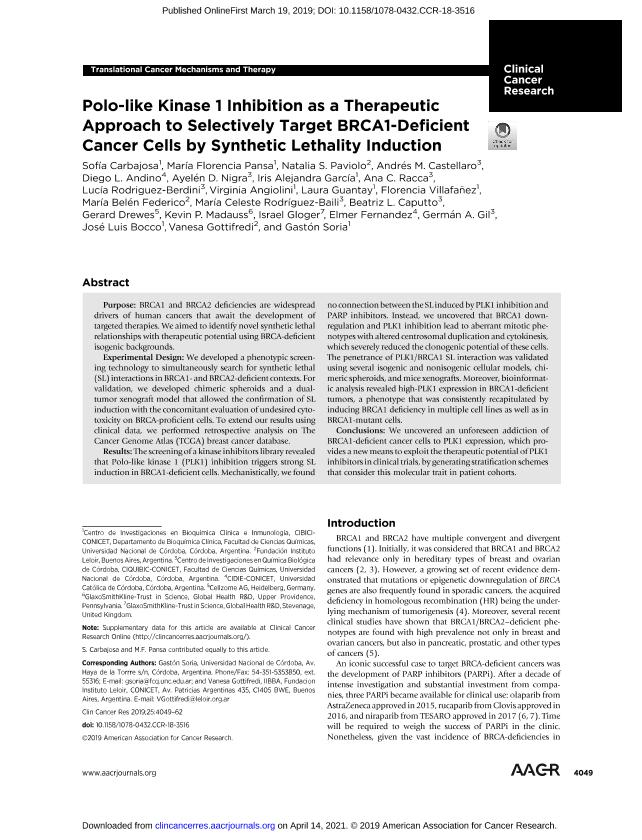Artículo
Polo-like kinase 1 inhibition as a therapeutic approach to selectively target BRCA1-deficient cancer cells by synthetic lethality induction
Carbajosa González, Sofía; Pansa, Maria Florencia ; Paviolo, Natalia Soledad
; Paviolo, Natalia Soledad ; Castellaro, Andrés Marcos
; Castellaro, Andrés Marcos ; Andino, Diego Leonardo; Nigra, Ayelén Denise
; Andino, Diego Leonardo; Nigra, Ayelén Denise ; García, Iris Alejandra
; García, Iris Alejandra ; Racca, Ana Cristina
; Racca, Ana Cristina ; Rodriguez, María Celeste
; Rodriguez, María Celeste ; Angiolini, Virginia Andrea
; Angiolini, Virginia Andrea ; Guantay, Maria Laura
; Guantay, Maria Laura ; Villafañez, Florencia
; Villafañez, Florencia ; Federico, Maria Belén
; Federico, Maria Belén ; Rodríguez, Lucía
; Rodríguez, Lucía ; Caputto, Beatriz Leonor
; Caputto, Beatriz Leonor ; Drewes, Gerard; Madauss, Kevin P.; Gloger, Israel; Fernandez, Elmer Andres
; Drewes, Gerard; Madauss, Kevin P.; Gloger, Israel; Fernandez, Elmer Andres ; Gil, German Alejandro
; Gil, German Alejandro ; Bocco, Jose Luis
; Bocco, Jose Luis ; Gottifredi, Vanesa
; Gottifredi, Vanesa ; Soria, Ramiro Gaston
; Soria, Ramiro Gaston
 ; Paviolo, Natalia Soledad
; Paviolo, Natalia Soledad ; Castellaro, Andrés Marcos
; Castellaro, Andrés Marcos ; Andino, Diego Leonardo; Nigra, Ayelén Denise
; Andino, Diego Leonardo; Nigra, Ayelén Denise ; García, Iris Alejandra
; García, Iris Alejandra ; Racca, Ana Cristina
; Racca, Ana Cristina ; Rodriguez, María Celeste
; Rodriguez, María Celeste ; Angiolini, Virginia Andrea
; Angiolini, Virginia Andrea ; Guantay, Maria Laura
; Guantay, Maria Laura ; Villafañez, Florencia
; Villafañez, Florencia ; Federico, Maria Belén
; Federico, Maria Belén ; Rodríguez, Lucía
; Rodríguez, Lucía ; Caputto, Beatriz Leonor
; Caputto, Beatriz Leonor ; Drewes, Gerard; Madauss, Kevin P.; Gloger, Israel; Fernandez, Elmer Andres
; Drewes, Gerard; Madauss, Kevin P.; Gloger, Israel; Fernandez, Elmer Andres ; Gil, German Alejandro
; Gil, German Alejandro ; Bocco, Jose Luis
; Bocco, Jose Luis ; Gottifredi, Vanesa
; Gottifredi, Vanesa ; Soria, Ramiro Gaston
; Soria, Ramiro Gaston
Fecha de publicación:
03/2019
Editorial:
American Association for Cancer Research
Revista:
Clinical Cancer Research
ISSN:
1078-0432
Idioma:
Inglés
Tipo de recurso:
Artículo publicado
Clasificación temática:
Resumen
Purpose: BRCA1 and BRCA2 deficiencies are widespread drivers of human cancers that await the development of targeted therapies. We aimed to identify novel synthetic lethal relationships with therapeutic potential using BRCA-deficient isogenic backgrounds. Experimental Design: We developed a phenotypic screening technology to simultaneously search for synthetic lethal (SL) interactions in BRCA1- and BRCA2-deficient contexts. For validation, we developed chimeric spheroids and a dualtumor xenograft model that allowed the confirmation of SL induction with the concomitant evaluation of undesired cytotoxicity on BRCA-proficient cells. To extend our results using clinical data, we performed retrospective analysis on The Cancer Genome Atlas (TCGA) breast cancer database. Results: The screening of a kinase inhibitors library revealed that Polo-like kinase 1 (PLK1) inhibition triggers strong SL induction in BRCA1-deficient cells. Mechanistically, we found no connection between the SL induced by PLK1 inhibition and PARP inhibitors. Instead, we uncovered that BRCA1 downregulation and PLK1 inhibition lead to aberrant mitotic phenotypes with altered centrosomal duplication and cytokinesis, which severely reduced the clonogenic potential of these cells. The penetrance of PLK1/BRCA1 SL interaction was validated using several isogenic and nonisogenic cellular models, chimeric spheroids, and mice xenografts. Moreover, bioinformatic analysis revealed high-PLK1 expression in BRCA1-deficient tumors, a phenotype that was consistently recapitulated by inducing BRCA1 deficiency in multiple cell lines as well as in BRCA1-mutant cells. Conclusions: We uncovered an unforeseen addiction of BRCA1-deficient cancer cells to PLK1 expression, which provides a new means to exploit the therapeutic potential of PLK1 inhibitors in clinical trials, by generating stratification schemes that consider this molecular trait in patient cohorts.
Palabras clave:
letalidad sintetica
,
expresion de genes
,
cancer
Archivos asociados
Licencia
Identificadores
Colecciones
Articulos(CIBICI)
Articulos de CENTRO DE INV.EN BIOQUI.CLINICA E INMUNOLOGIA
Articulos de CENTRO DE INV.EN BIOQUI.CLINICA E INMUNOLOGIA
Articulos(CIDIE)
Articulos de CENTRO DE INV. Y DESARROLLO EN INMUNOLOGIA Y ENFERMEDADES INFECCIOSAS
Articulos de CENTRO DE INV. Y DESARROLLO EN INMUNOLOGIA Y ENFERMEDADES INFECCIOSAS
Articulos(CIQUIBIC)
Articulos de CENTRO DE INVEST.EN QCA.BIOL.DE CORDOBA (P)
Articulos de CENTRO DE INVEST.EN QCA.BIOL.DE CORDOBA (P)
Articulos(IIBBA)
Articulos de INST.DE INVEST.BIOQUIMICAS DE BS.AS(I)
Articulos de INST.DE INVEST.BIOQUIMICAS DE BS.AS(I)
Citación
Carbajosa González, Sofía; Pansa, Maria Florencia; Paviolo, Natalia Soledad; Castellaro, Andrés Marcos; Andino, Diego Leonardo; et al.; Polo-like kinase 1 inhibition as a therapeutic approach to selectively target BRCA1-deficient cancer cells by synthetic lethality induction; American Association for Cancer Research; Clinical Cancer Research; 25; 13; 3-2019; 4049-4062
Compartir
Altmétricas



